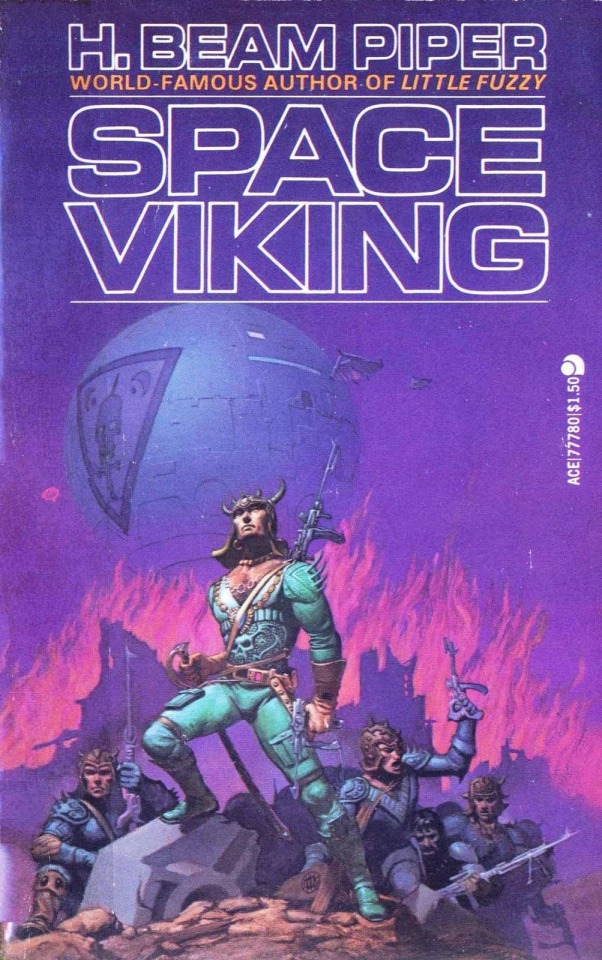#H. Beam Piper
Text
Lucian's Library 6
Feel free to suggest never written books you wish you could read.
Some items suggested by impatient readers for still living authors.
#Terry Pratchett#Discworld#Gnu#Lay of Eárendil#JRR Tolkien#The Princess Bride#Robert Jordan#Wheel of Time#Wan Shi Tong's Spirit Library#Avatar: the Last Airbender#Clive Barker#Abarat#Rosemary Kirstein#Steerswoman Series#The Aeneid#Virgil#The Fuzzy Sapiens Series#H. Beam Piper#Plutarch#Epaminondas#Melanie Rawn#Exiles Series
55 notes
·
View notes
Photo
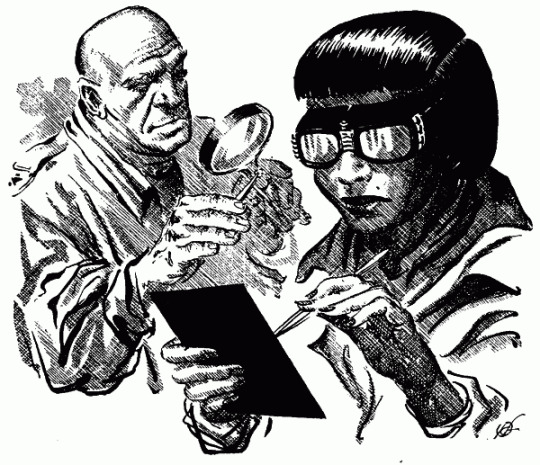
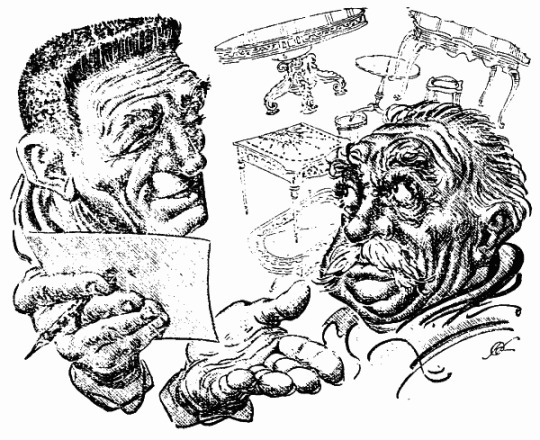
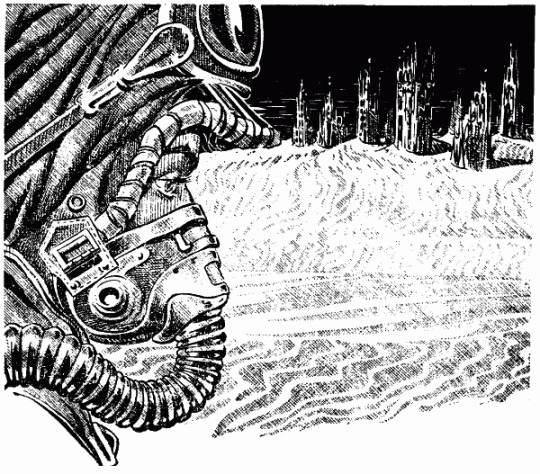
Frank Kelly Freas’s illustrations for H. Beam Piper’s short story, “Omnilingual,” a science fiction story set around the effort to translate the long-dead Martian language, not spoken for a quarter million years.
It is a rare example of a scifi story set around the challenges of linguistics and archeology.
145 notes
·
View notes
Photo

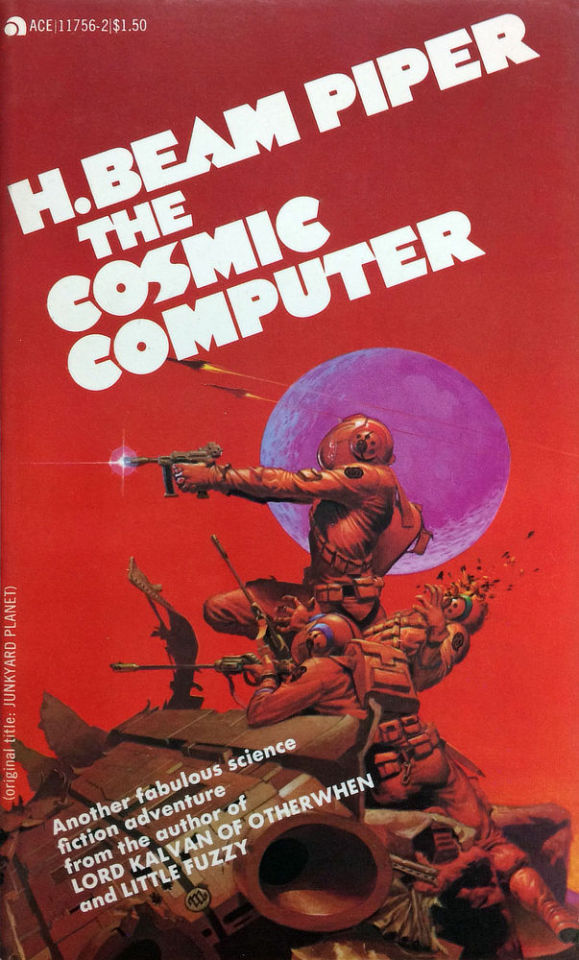
Michael Whelan, cover illustration for The Cosmic Computer, by H. Beam Piper (Ace Books, 1983). Acrylic on illustration board, 28 x 18 inches.
__________________________________________________
Our shop: https://bookshop.org/shop/manyworldspress
#michael whelan#h. beam piper#the cosmic computer#science fiction art#science fiction novel#fantastic illustration
107 notes
·
View notes
Text
Sam Reviews: H. Beam Piper
I bought a fat collection of short stories and novels by H. Beam Piper, a sci-fi writer of the 50s and 60s. It holds up quite well, I think, as I reread the whole collection recently. There's a variety of content, from alien first contact to space-pirates and time travel, and a "thick" setting base for much of it with elements like carniculture or the veridicator that pop up in several stories without being the basis of one. Piper uses a pair of shared universes for many of his stories where you can see connections without needing to have read the previous. I think there's also less showing off wiseass references than in a lot of contemporary sci-fi, though I might simply have missed some.
The odd pair out is Graveyard of Dreams and its quasi-rewrite The Cosmic Computer, which belong to the first shared universe. Both books have the same start: Boy comes home to frontier colony planet after having studied at prestigious university in the core worlds, receives welcome as hometown hero, is now expected to solve planet's problems of being a run-down backwater after the space war, also find the allegedly war-winning supercomputer that's rumored to be located somewhere nearby and could be dug up like it's pirate treasure. Boy has learned at university the computer is probably imaginary, but it would break the community's hearts to tell them.
Graveyard takes the view that the population has been thinking too much in terms of blaming the war and hoping for the plot-device computer instead of doing anything, so the boy tells his dad the computer isn't real, and they start a conspiracy to reform the planet as part of the computer hunt:
The computer might be on the moon, or another planet in the same solar system, so we'll need a spaceship. We can't search the whole planet in one go, so we'll need regular refueling and resupply and a spaceport here. We'll need radars and scanners and drones and other things bought from Earth, so we'll have to invite trade ships to our spaceport, and produce things to sell for Earth currency. Implementing the computer's economic plan once we find it will no doubt require infrastructure, which we should build up in advance. And so the colony gets better, ostensibly as part of looking for the computer.
Through all this, I never felt like Piper was dunking on people who put all their hopes and dreams in a problem-solving magic supercomputer, or on fellow sci-fi writers with their plot device computers. There's very little vitriol. Characters had simply built up their hopes too high. (If he had written it sixty years later, though, I might have thought it was a dunk on people going "crypto fixes this! put vegetables on the blockchain!")
The story is in one sense hard sci-fi, because it limits itself to realistic known capacities of computers, and in another sense, not sci-fi at all, because the computer is a pure McGuffin and the moral of the story is that people should work on solving their problems and improving their community instead of hoping for a McGuffin to fix everything.
The Cosmic Computer starts the same way with much the same plan, and a "salvage company" double-bluff that's supposedly supposedly for picking up other things while hiding the secret supercomputer, but supposedly actually for getting the computer, but actually just for looting abandoned military bases from the war as a way of revitalizing the economy.
Then they find the computer for real, and things get odd.
---
Uller Uprising is one of his earliest stories and the first I read that hinted at the specific timeline mentioned above, branching off from the era when he wrote, that did not come to pass but is an interesting speculation to read. The dating system is AE (Atomic Era), counting from 1942, when mankind first harnessed nuclear power. Most of the Northern Hemisphere nuked itself (or each other) in great power conflict in later world wars that timeline; the rebuilding of Earth and colonization of the stars was mostly done by Southern Hemisphere states such as South Africa and Argentina. The story features a pair of ships named Paul Kruger and Jan Smuts.
Oh for the South Africa that was! Piper saw a country that would reach for the stars once the US and SU had ground each other down. South Africa once had a nuclear power program. Now it can't keep the lights on. But I digress.
The scene for the Uprising is a Terran trading colony, in the 'colonialism' sense like the British India Company, on a world populated by aliens. Piper's aliens are polylithic*: among them is joy in prosperity, and resentment at colonists, and desire to learn, and factional infighting, variety "I want those fancy gadgets the Terrans have so I can crush my rival", and variety "I want to manipulate the Terrans into crushing my rival for me". They have personality of their own, rather then being mere foils or subjects of history. One can say that such infighting is the often the downfall of colonized people, but that begs the question of calling them "a people" in the first place, rather than two peoples who fought until they both lost to a third.
*I would have said "diverse" but that has other connotations these days.
There's an angry mob of Ullerians that's been inflamed into simply going out and murdering Terrans, and there's cunning Ullerians who have signed on for a term of work on Terran ships going to the uranium mines, to learn the secrets of nuclear power. There's also awful smut that's relevant in-universe. Quite good stuff.
---
Little Fuzzy is also set in the Atomic Era timeline. The Terran Federation is spreading across the stars, and on the planet Zarathustra, the prospector Jack Holloway stumbles across an odd creature:
He turned quickly to see two wide eyes staring up at him out of a ball of golden fur. Whatever it was, it had a round head and big ears and a vaguely humanoid face with a little snub nose. It was sitting on its haunches, and in that position it was about a foot high. It had two tiny hands with opposing thumbs.
He thinks it's cute, and adopts it to live in his house, and the critter brings its family, and he sees they're smart enough to use tools when eating some of the other local wildlife.
This raises a question of whether they're smart enough to count as native sapients and should have rights to the planet. We hear about the "talk and build a fire rule" which is the precedent of a future court case deciding that those two activities are sufficient proof of sapience, but not necessary for it, as shown in another court case when a woman murdered her infant baby and tried to plead that the baby couldn't talk nor build a fire, and was convicted of murder anyway.
Jack Holloway, of course, is all in favor of getting his cute adopted fuzzball recognized as sapient. The antagonist of the story is the Zarathustra Company which holds a Class-III legal charter for the settlement of an uninhabited planet; recognition of the Fuzzies would make it an inhabited Class-IV planet and void the corporate charter and make a lot of rich people lose a lot of money.
Again, there's a lack of dunking. The ZC is wrong, and commits crimes in an attempt to maintain its position, kidnapping the Fuzzies, fabricating evidence, and so forth. But I don't hear commie sneering from Piper as the ZC loses in court and one of its corrupt cops is put to a veridicator.
It's a very sci-fi piece of technology: an advanced mind-reading (brain-reading?) lie-detector helmet with the finesse to identify technically true but misleading statements.
There was a bright conical helmet on his head, and electrodes had been clamped to various portions of his anatomy. On the wall behind him was a circular screen which ought to have been a calm turquoise blue, but which was flickering from dark blue through violet to mauve. That was simple nervous tension and guilt and anger at the humiliation of being subjected to veridicated interrogation. Now and then there would be a stabbing flicker of bright red as he toyed mentally with some deliberate misstatement of fact.
---
The veridicator pops up again in Space Viking, farther in the future. The Terran Federation is disintegrating.
"Nifflheim, no! There aren't a dozen and a half planets in the Old Federation that still have hyperdrive, and they're all civilized. That's if 'civilized' is what Gilgamesh is," he added. "These are homemade barbarians. Workers and peasants who revolted to seize and divide the wealth and then found they'd smashed the means of production and killed off all the technical brains. Survivors on planets hit during the Interstellar Wars, from the Eleventh to the Thirteenth Centuries, who lost the machinery of civilization. Followers of political leaders on local-dictatorship planets. Companies of mercenaries thrown out of employment and living by pillage. Religious fanatics following self-appointed prophets."
The viking-esque privateers of the Sword Worlds are raiding the Federation worlds for loot and machinery and personnel to build anew on their own planets; this situation is already so far advanced that one character bemoans the Sword Worlds themselves sliding into decadence and barbarism as their best and brightest leave to outright conquer Federation worlds and live there. All this is the backdrop to a hunt for vengeance and a grudge to be settled between one Space Viking and another, which in the process results in taking over a world and becoming King, and watching another world collapse.
---
Some of the minor stories:
Naudsonce is about first contact with an alien species and the attempts to establish communication when the odd aliens make sounds, but do not seem to have language. They can gesture enough for trade, though, and sell off some of their spare livestock. The brass provisionally file it as Domesticated Type C. The enlisted men, wanting to discuss the barbecue, cut this down to "domsee" and the name sticks.
Lone Star Planet is rather comic: there's a planet settled by exaggerated Texans, the most Texan ones who wanted to live in Space Texas specifically, and they brought the Alamo with them on a spaceship. They breed dinosaur-like "supercows" on their ranches, their cowboys need tanks for herding the supercows and implicitly constitute small armies, and it's legal to kill politicians for the crime of attempted taxation. Our protagonist is a nervous new ambassador sent to this planet after his predecessor was killed, suspecting that his government wants him also killed as casus belli. (Partly inspired by H.L. Mencken's The Malevolent Jobholder.)
A Slave is a Slave concerns the imperialistic abolition of slavery on a planet where slavery has been the order of the day for so long that it's becoming an in-name-only matter: the "slaves" are the ones who operate everything important, while the "masters" spend their days in petty feuds with each other. The imperial potentate sent to oversee abolition is a first-timer, learning on the job how to administrate foreign planets. This does not go entirely smoothly.
Hunter Patrol is a time loop. A present-day soldier is drawn to the future to help overthrow a tyrant that has conquered the world and conditioned people into servile pacifism. Returning to his own time with a bit of loot and papers from the tyrant's office but without future memories of what they are or why, he uses the future knowledge to become rich and powerful, aims to establish world peace, and ironically becomes the tyrant murdered by his past self.
Null-ABC depicts a future where "Literate" has become a profession; most people aren't literate and look down on the concept. Instructions are usually pictographic, or you hire a Literate to read it for you. Data storage and messaging is commonly audio. TVs and videos are still around, naturally. This because Literacy is associated with propaganda pamphlets and hell-tomes like Mein Kampf and Das Kapital, and the four world wars they caused. This is the one story where I recall Piper does get in some cheap jokes, in the world news report of items such as,
"The Central Diplomatic Council of the Reunited Nations has just announced, for the hundred and seventy-eighth time, that the Arab-Israel dispute has been finally, definitely and satisfactorily settled."
unrelated to the plot of the story, which involves political strife about the status of Literates and literacy.
That joke has aged very well, I must say.
---
Piper's second shared universe set of stories is the Paratime collection. In a future without interstellar travel, as Earth's resources run dry, mankind has instead developed the technology of visiting alternate timelines and parallell universe Earths. On the uninhabited ones, futuremen mine resources directly; on the inhabited ones, futuremen buy from the local miners.
This gives the protagonists reason to get involved pretty much anywhere in history or alt-history as they have to cover up the Paratime Secret, or stop a time crime, or catch the Venusian Nighthound that some dumbass let loose in a 1950s America before the cops ask too many questions about the unusually mutilated cattle. It is a really great Excuse Plot for whatever time period, technological level, and/or cultural group the author feels like writing about today.
It could easily have stopped there, and become a series of disconnected anecdotes and shiny distractions, but Piper executes it well and gives it context. Home Timeline has people and places and customs and strife, although some of the bits feel clunky to me.
Tortha Karf fingered them and nodded. Then he became as visibly angry as a man of his civilization and culture-level ever permitted himself.
"What does that fool think we have a Paratime Code for?" he demanded. "It's entirely illegal to transport any extraterrestrial animal or object to any time-line on which space-travel is unknown. I don't care if he is a green-seal thavrad; he'll face charges, when he gets back, for this!"
It's very hard to make future ranks sound appropriately important while staying foreign, and "green-seal thavrad" falls short, IMO.
(Also clunky: "We'll blow them to Em-See-Square!" elsewhere in Piper's writing.)
Most of the Paratime protagonists are time cops of some sort, though with a major exception: Calvin Morrison, a man from our time's America, gets sucked up in the wake of a paratime travel vehicle. Falling into a timeline where America was colonized by an eastward Indo-Aryan migration and the technology level is late medieval, he becomes Lord Kalvan of Otherwhen, protagonist of his own novel by the same name and several sequels by Piper's peers.
(A time cop stops by to check whether the Paratime secret has been leaked, and is very satisfied that Calvin has told everyone "a wizard did it" and is helping to keep the secret.)
In this alternate timeline, America is divided into kingdoms worshipping the Wolf-God and the Sky-Father and the Earth-Mother and other interpretations of ancient Aryan deities as filtered through 1950s historiography and then cultural drift as imagined by Piper, which makes it an interesting sort of foreign place. But the supreme god of the time is Styphon, whose priesthood alone holds the secret of making fireseed (gunpowder). This monopoly is the main source of their power, and Calvin is about to break it.
The plot outline "Contemporary man falls into the past/fantasy world and introduces gunpowder" has been recycled a thousand times by worse writers, and I wonder how many of them would trace their literary ancestry back to Piper if we could see who they'd copied. I know it's more than zero: like with Journey to the West but less famous, reading Lord Kalvan made several things click into place as I recognized elements other authors had been copy-pasting that made sense in the original but were weirdly out-of-place in the flimsy knockoffs. Literary cargo cult.
---
In closing, Piper was an original writer, and I recommend his stories.
No man is entirely original, one can locate him easily in the late golden age of American scifi with peers and influences, but he stands out to me as the sort of person that others were copying a great deal. Lord Kalvan I mentioned above, the Sword-Worlds of Space Viking went right into the Traveller RPG, Little Fuzzy was rebooted by John Scalzi as Fuzzy Nation, Star Trek's "tribbles" were originally "fuzzies" before Legal got involved, the Paratime series was an inspiration for Charles Stross's Merchant Princes, the list goes on.
And it looks to me, as with several other of my favorite and respected authors, that this is partly because he could draw on a wide set of life experiences outside of the incestuous 'literary class'. (Vague, I know.) He worked on the railroad, he studied engineering, he collected firearms and helped compile a collection of archaic ones. His short story Omnilingual turns on the fact that science has a shared true referent: the Periodic Table of the Martians must refer to the same elements as on Earth, and so the long-dead Martians' language is deciphered.
I might say: he was a shape rotator. :-)
7 notes
·
View notes
Photo

Cover by Walt Miller
#cover art#coverart#magazine cover#magazine#digest#astounding#1950#science fiction#scifi#pulp magazine#pulp science fiction#1950s#1950's#h. beam piper#ephemera
20 notes
·
View notes
Text
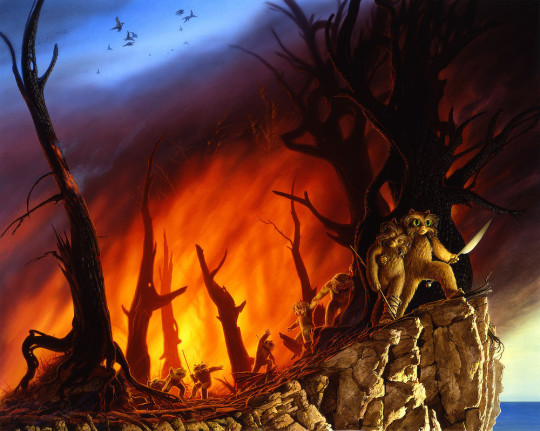
something something me and my mutuals going into 2024
Michael Whelan - FUZZY FIRE (1983)
Acrylic on watercolor board - 25" x 31"
3 notes
·
View notes
Text

Lord Kalvan of Otherwhen by H. Beam Piper (1965)
Art by Michael Whelan
2 notes
·
View notes
Link
So, I’ve just posted my Scottish Independence poems and a Short Story I wrote about 30 years ago to Ao3.
I don’t know if I’ll ever add anything else to it but I wanted to preserve them as I am quite proud of them.
1 note
·
View note
Text
Multiverse Madness!
In my recent discussion about time travel I touched on the idea of the branching timelines. It’s an idea that is very attractive. We’ve all thought, at one time or another: “What if I had done something different? What if I had just walked away? What if I had turned left instead of right?”
What if that universe, the one where I did something different, was just around the metaphorical corner?…

View On WordPress
#Doctor Strange and the Multiverse of Madness#Everything Everywhere All at Once#H. Beam Piper#H. G. Wells#Hugh Everett III#Keith Laumer#Men Like Gods#Michael Moorcock#Murray Leinster#Paratime#Spider-Man: Into the Spider-Verse
0 notes
Text

H. Beam Piper’s Space Viking — this is the 1977 Ace edition, fronted by a typically fantastic Michael Whelan painting.
Gotta admit, when I first picked this up, it was as a joke because the title struck me as fairly hilarious. However, it is actually extremely good! The title sets expectations — the novel is a sprawling interplanetary science fiction yarn concerning war, politics, murder and revenge that maps broadly to the action of Viking saga. It is a very different sort of book, really, but I think it kind of rhymes with Poul Anderson’s Broken Sword in a funny kind of way?
I also didn’t know it at the time, but the novel is also a huge, direct influence on Traveller. It takes place among the Sword Worlds, each named for a famous sword from Earth’s legends. There is a ship named Beowulf. There’s a strangely feudal empire, though it is rapidly decaying and falling into disarray (anticipating the Imperium’s shattering in MegaTraveller and its ruin in New Era, and the emergence of…Star Vikings).
99 notes
·
View notes
Text
Last Lunesday of the Week
Listening: Mostly going through my library on "random by album" (latest: FMAB, Alestorm) and the local dance/EDM mix radio station's archives.
Reading: Finished issue 1 of "Speculative North", an anthology that I received as a gift many years mack. Also finished What If 2, and shelved a Pope Francis cartoon bio and The Salmon of Doubt, a Doug Adams autobio from found documents on his posthumous hard drives. Not really a theme here beyond cleaning off my shelves.
Recent fun read was H. Beam Piper's The Cosmic Computer, which I found after finishing Little Fuzzy.
It's not a Heinlein story, but the way that Piper draws these frontier worlds feels like Heinlein's settings. But where Heinlein writes stories of things which are solved by individual action, Piper writes (n: 2) about stories which are solved by processes set in motion, and the orderly functioning of the dregs of bureaucracy. Piper believes that Government will function, in a way that is very different from anything else I've read lately besides glowfic.
Writing: Gearing up for NaNoWriMo with more Gundam Iliad prep work. Besides the cyberdeck project, I'm going to be starting a scene-by-scene flowchart of different takes on The Iliad.
Spite/Research: might be editing gundam.fandom.com to add a bunch of missing stuff for Johnny Ridden and some related things.
Watching: It was a two-shot weekend, so I binged Saga of Tanya The Evil on a rewatch. Now I have to go watch the movie.
Injuries: +1 flu shot, +1 COVID booster, +2 elbow needles, -4.5 vials of blood for routine bloodwork (half a tube wasted when the needle backed out accidentaly). Lost a fair-weather biking glove on my way back from the jab, so I'm out like $50 there.
Playing: More Tears of the Kingdom, trying to find more quest items and caves and wells, but not in any organized fashion. Doing this in an organized fashion would require getting one of the checklist apps or signing up for an app, which I do not want to do.
Crafting: On the recommendation of a friend, I've gone and acquired all the parts for making an Ikea Vindriktning into an IOT AQI logger. Should be interesting.
Gotta model some revisions for the next phase of my Pi cyberdeck project, but I'm having trouble getting that Rasbian to load phosh/phoc, which is very annoying. Maybe I should stop fucking around and just use GNOME. Once that's done, I still need to figure out I2C addressing.
Halloween approacheth; it's time to actually sit down and remodel my 2023 NASFiC costume into something that can be worn for more than 4h. Big messes of orange filament in my future; it may be time to build a printer enclosure.
2 notes
·
View notes
Photo
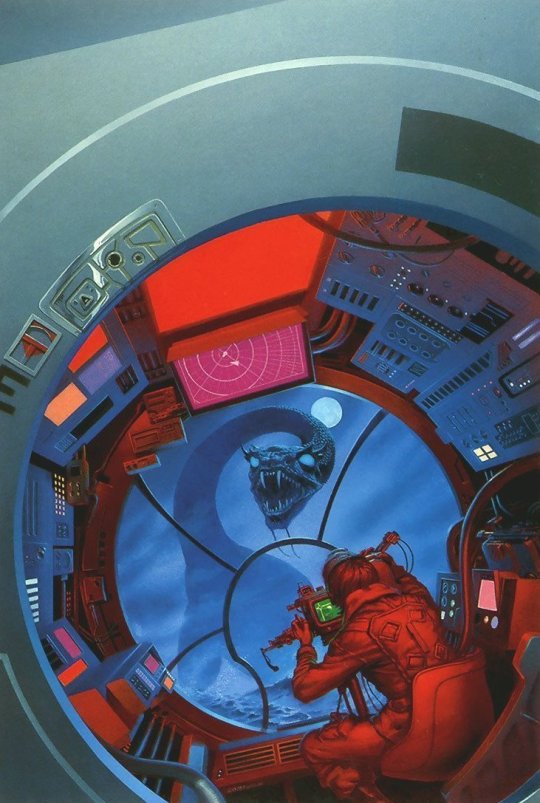
Michael Whelan
310 notes
·
View notes
Text
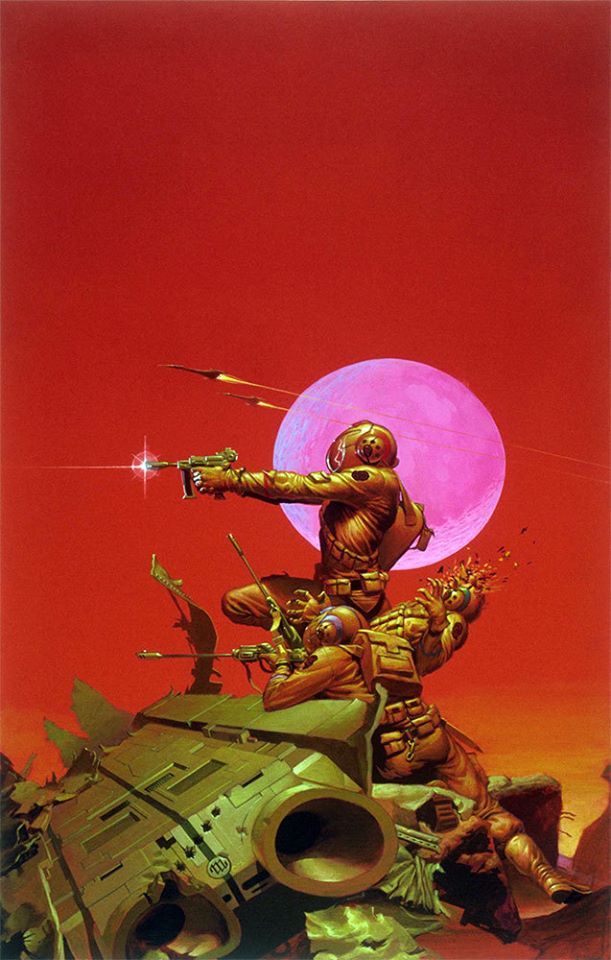
Cover by Michael Whelan for H. Beam Piper's The Cosmic Computer (1975).
5 notes
·
View notes
Text
Despite the 48 intervening years, the novella still comes easily and disagreeably. Davidson in particularly is frighteningly familiar, a white supremacist assured of his moral certitude, convinced that he has both the right and duty to murder creechies after they rise up from forced servitude and destroy a logging camp, killing some 200 Terrans. Following an interdict from Earth—a member of the new League of Worlds—that the Terran colonists of New Tahiti leave the Athsheans alone pending the League’s audit of the colony’s impact on the indigenous humans (an intervention pushed by Terran anthropologist or “hilfer” Raj Lyubov and two visiting non-Terran humans, a Cetian and a Hain), Davidson refuses to give up his crusade against the creechies.
Like H. Beam Piper’s Little Fuzzy before and James Cameron’s Avatar after, Word for World pits the Bad Guy against the indigenous population as a representative of the worst aspects of human (Terran) life: a god-hero complex driven by greed, racism, and self-assured superiority over all life. The Davidson figure (Kellog in Piper, Quaritch in Cameron’s film) is juxtaposed by Lyubov, an anthropologist who advocates strongly for Athshe’s independence, representing a vaguely liberal they’re-human-too response to Terran expansionism. Word for World departs from the eco-capitalist fantasies of similar texts, from the idea that colonial expansion and resource extraction are OK but within reason, by presenting things from the indigenous perspective and not treating the “within reason” perspective as the final word on colonialism.
In other words, Le Guin provides a strong case for the Athsheans’ swift and violent retaliation against the Terrans, including the killing of 500 women (newly brought to New Tahiti to “entertain” the two-thousand-plus workforce of Terran men) so the Terrans cannot “breed.” Readers of course are aware that the colony has a brand new ansible, has just learned of the League’s new interdict against conflict with the locals, and might very well lose their colonial charter. This is the “within reason” response: Earth learn that the colonists went “too far,” so an attempt must be made to reign them in; as Colonel Dongh, administrator of the colony tells Selver, temporary leader of the Athsheans upon the Terrans’ defeat, the release of “voluntary” laborers should have been enough to appease the Athsheans. This is the rhetoric of bullies and empires when their former victims are still angry: But we stopped murdering/bombing/enslaving you, so why’re you mad?
75 notes
·
View notes
Photo
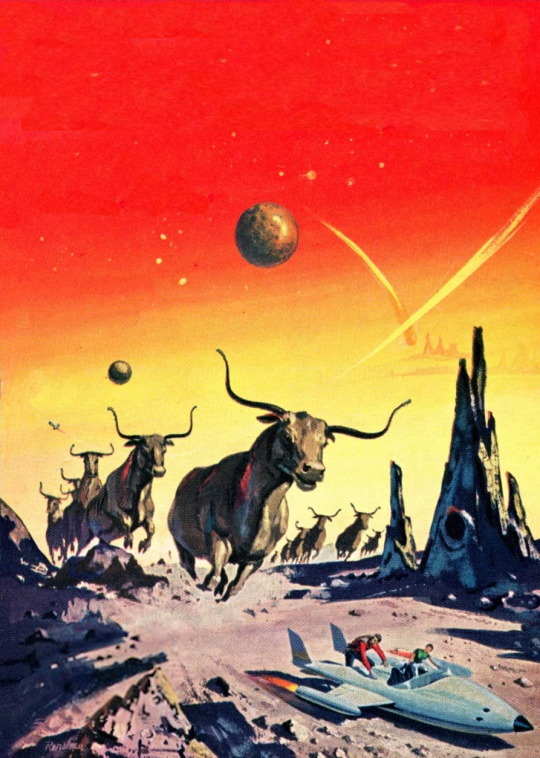
Arthur Renshaw’s 1958 cover art for A Planet for Texans by John J. McGuire and H. Beam Piper
782 notes
·
View notes

